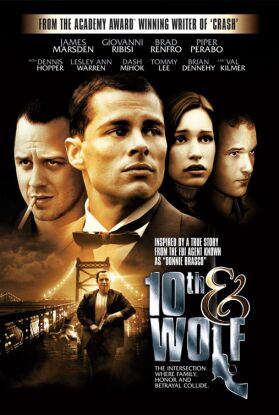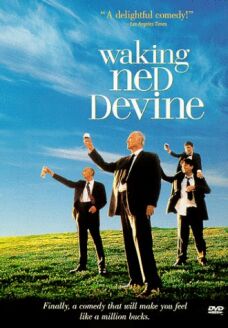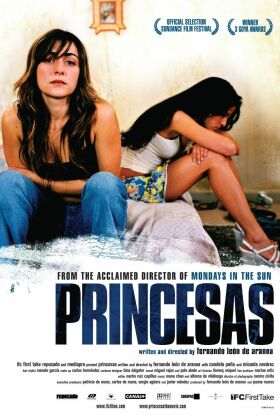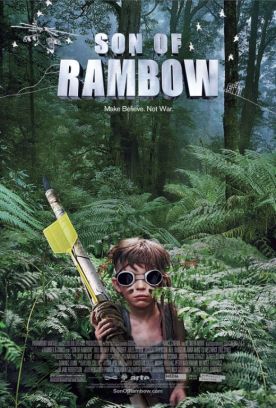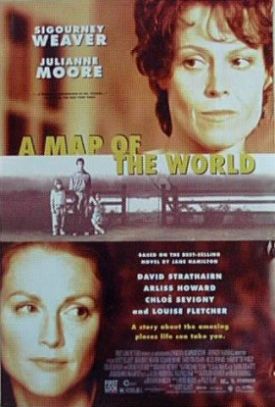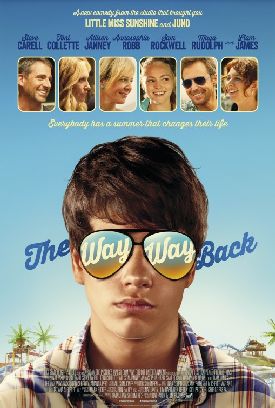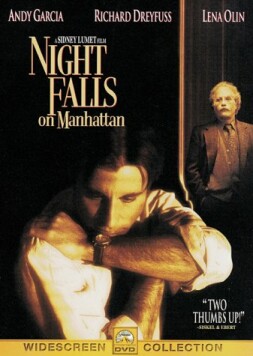10th & Wolf
Even the tag line of Robert Moresco’s 10th & Wolf sounds tired: “The intersection where family, honor and betrayal collide.” Oh, so it’s another Mafia movie then. Well, yes, but actually it’s even more tired than that, as it tries to combine a familiar Mafia tale with the even more familiar theme of the sensitive youth disillusioned with the corruption and hypocrisy of his elders. I’m sorry, but I just didn’t buy the whole concept of this particular sensitive youth, who is called Tommy (James Marsden). He struck me as a fake from the first voiceover about his bitter disappointment to discover that his father, hitherto his hero, was a “made man” in the Philadelphia Mafia who “killed people.” Dad himself had been killed when little Tommy was only 12 and, now big and a Marine serving in the first Gulf War, Tommy says that “He probably deserved it.” Tommy’s high-principled disapproval about his father’s occupation is also reflected in his attitude to the war. So distraught is he to think that the coalition forces have stopped short of the overthrow of Saddam Hussein that he assaults a military policeman and steals a jeep, which is why he finds himself in the brig as the film begins.
Though 10th &Wolf is said to be based on a true story, none of this rings true to me. What son would say, or think, that his father deserved to die because of unknown but merely guessed-at things done to strangers? And though the failure to topple Saddam Hussein in 1991 may have been regrettable, I don’t remember much agonizing about it at the time — certainly not among enlisted men on the ground in Iraq. No, Tommy’s pedigree is not so much Philadelphia Italian as it is European Hemingway. It is the literary artifice of the embittered and disillusioned hero coming back from World War I with a chip on his shoulder about the hypocrisies of the older generation. The breed enjoyed a new lease of life during the Vietnam era, and fed into the idea of the corrupt and vicious military establishment that has remained with us — or at least with Hollywood — to this day. Now Mr Moresco and his screenwriter, Allan Steele, are trying to squeeze another iteration of the type out of the Gulf War, the ground phase of which lasted only a couple of weeks.
Not only is Tommy turned to the bad by George Bush Senior’s failure to nail Saddam, but so is a character called Murtha — followers of the politics of the current Iraq war will see the name’s significance — played in a brief cameo by Val Kilmer. Murtha has no other purpose in the film than to say, as he drowns his sorrows at the bar: “My kid’s dead and Saddam’s alive. I don’t understand.” The idea of the betrayal of the young by the old was the earliest version of the self-pity that still lies at the heart of the youth culture. Nor are dear old dad and the first President Bush the only elders with whom Tommy remains deeply disillusioned. He is rescued from the brig and three years of hard labor by a couple of FBI agents called Horvath (Brian Dennehy) and Thornton (Leo Rossi) who also turn out to be corrupt. Isn’t there anyone a boy can trust?
Horvath and Thornton offer Tommy his freedom in exchange for help in infiltrating the Philadelphia mob, one of the rising stars of which is Tommy’s own cousin Joey (Giovanni Ribisi) — and in bringing down a particularly dangerous Sicilian gangster and heroin importer called Reggio (Francesco Salvi). Tommy may affect to despise the Mafia, but he ain’t no rat, see? He angrily refuses to play stoolie for the Feds, even if it means doing hard time in a military prison, until they tell him that his kid brother Vincent (Brad Renfro), led astray by Joey, is headed for the pen himself unless he, Tommy, does the government’s bidding.
The bond between Tommy, Joey and Vincent, you won’t be surprised to learn, goes back to early childhood, and a flashback to their brawl with a rival gang in a diner in 1984 establishes their relationship as being of the closest. To the admiring Brandy (Piper Perabo), the young widow of Tommy’s predecessor as the FBI mole in Joey’s gang (Joey found out), they had seemed “like the Three Musketeers, but without the costumes.” Joey is a study in light and dark and so a more interesting character than the unidimensional Tommy or Vincent, but he too has a beef with the older generation that reaches even as far as the Italian heritage to which, at a significant moment, he is said to be a disgrace. Joey’s American high-spiritedness and skepticism are contrasted with the Old World brutality and high culture of Reggio and his gang. The latter must be the worst kind of Mafia don because he is an opera-lover, and we see him weeping at an informal performance, at his own dinner table, of the climax of Leoncavallo’s Pagliacci. Joey leans over to Tommy and whispers: “It’s a f****** clown!”
This is one of several ways in which the film displays what might seem a gratuitously philistine and xenophobic aspect. Joey proudly announces that he speaks only “American” and not Italian and later guns down another Sicilian as he tries to teach Italian to Vince. When the inevitable war with Reggio finally begins, Joey cries: “F*** these f****** foreigners!” What is all that about? Perhaps, just as The Godfather Parts I and II back in the 1970s reflected the American immigrant experience in the early part of the 20th century, so 10th & Wolf is meant to express the neo-nativism of the third and subsequent generations of immigrants in the early part of the 21st. It’s the only reason I can think of why anyone would have bothered to make it.
Discover more from James Bowman
Subscribe to get the latest posts to your email.

